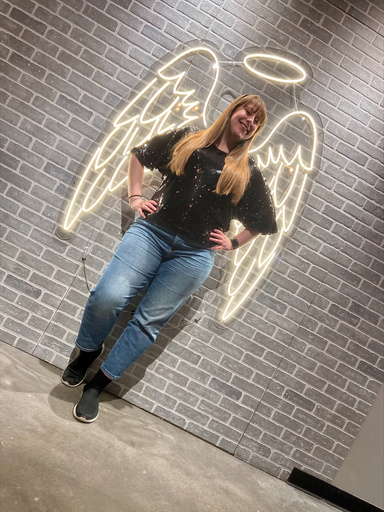
Hometown: Bloomington, Illinois
Graduate Program: Biomedical Science (Molecular Medicine)
Undergraduate degree: University of Iowa
Why did you choose the UI Biomedical Science Graduate Program, and what has the experience been like?
I completed my undergraduate degree at the University of Iowa in genetics and biotechnology with a minor in microbiology. For graduate school, I wanted an interdisciplinary program, as I wasn't sure which field of biology I wanted to work in after finishing school. The molecular medicine graduate program allowed me to rotate in labs across a variety of disciplines and project topics and take courses in many different subjects. I also knew I really liked the Iowa City area, so when I was accepted into the program, I was thrilled.
The first two years of the MMED PhD program consisted of lots of classes and three lab rotations. I got to experience working with professors with very different personality and lab types. It was a tough choice when it came to decide on a lab, as I enjoyed them all. I recently finished comprehensive exams and am now focusing on my dissertation research. I get to collaborate with other students in other programs and professors in other departments, who have expertise in the various aspects of my project.
What research are you performing?
I work with the environmental toxin group called polychlorinated biphenyls (PCBs). These are found pretty much everywhere you can imagine, especially in older buildings and paint pigments. They contribute to a variety of health issues including cancer, liver disease, neurobehavioral abnormalities, reproductive issues, and metabolic syndrome.
My focus is how PCBs are implicated in liver disease and metabolic syndrome—specifically, how PCBs are metabolized and how their metabolites negatively impact these systems. I use a novel cell culture method, using liver cells to form three-dimensional organoids, or "spheroids," as these better recapitulate liver function when compared to cells grown in 2D. I look at what metabolites are formed and how these impact the morphology and function of the liver cells.
What do you hope to do after you earn your degree?
I'm very interested in how infectious diseases cause or contribute to chronic diseases. There have been several studies looking at the role of COVID-19 infection and the development of autoimmune diseases such as Type I diabetes. This is the kind of work I am interested in researching. Are there more viruses and bacteria out there that cause long-lasting or chronic illnesses?
What is something that surprised you about this program?
How friendly everyone is and their willingness to help out and collaborate! Students who have been in the program for much longer than me are always willing to help and give me advice on anything and everything—whether it's science related, or about Iowa City, or mentor recommendations. I feel like there is always someone to reach out to if I need anything.
What is your favorite part about being a graduate student at the University of Iowa?
There are lots of student-led organizations to join and endless oppourtunities. I have joined several organizations and clubs over the years in various subjects—sports, science, leadership, etc. There is always something happening on campus and events to attend. The graduate student and professional government organization always has activities planned (with free food—who doesn't love that?), and the Association of Multicultural Scientists has doughnut and coffee breaks every other week. There's a new departmental organization centered around female scientists in different disciplines (Women in Microbiology and Immunology) and even a group for individuals within the university and hospital setting that have disabilities and their caregivers (Diversability Employee Resource Group).
How do you manage your personal well-being as a PhD student?
I believe that mental health and time to relax are key in any PhD student's life (or rather, anyone's life). Although it can be difficult to take time to yourself, I believe in taking at least an hour a day to do something non-work or school related. I usually engage in my hobbies or watch a TV show with my husband. I also am a strong believer in therapy and talking to someone to destress. Talking about your concerns and anxiety is a great way to relieve some of the pressure you feel!
What are some of your personal interests?
I love to craft and decorate my apartment with my creations. I also am a huge cat lover. I know all the best places to eat for every kind of food interest and love taking part in local events. I am a member of a local boxing gym and also enjoy taking walks with my husband.
What would you say to a prospective student who is considering the University of Iowa for PhD training in the biomedical sciences?
It's important to give every prospective school a chance. Look at the overall scope of the university—are the classes you would take in fields that you're interested in? Would they be important to your research? Are there faculty members engaging in research you find interesting? (It's best to rotate in a variety of labs of different topics—go in with an open mind!) Can you see yourself living in Iowa City for at least a couple of years? Are there clubs and organizations that interest you that you could become a part of? In your gut, does this feel like the place you're supposed to be at? Most of all, reach out to some current students. Ask them about their experiences and their like and dislikes of their current program. Even if you don't end up attending, you'll have new connections you can reach out to if you ever need anything!